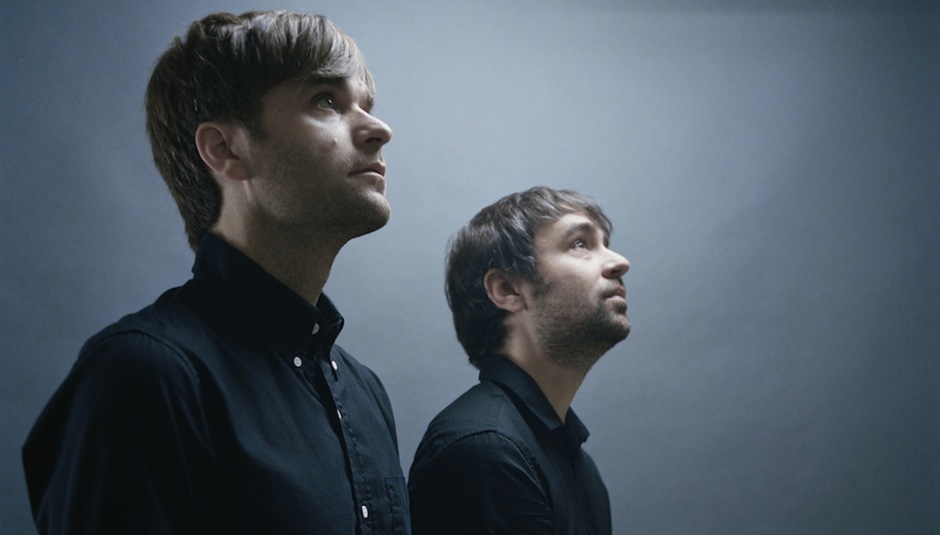On February 19th 2003, a band called The Postal Service released an album called Give Up. It was the product of a curious union between vocalist Ben Gibbard of Death Cab for Cutie and the producer Jimmy Tamborello, known as Dntel. The pair had been exchanging CD-Rs through the post and working on their glitchy, introspective electro-pop independently in their bedrooms. Their record label, Sub Pop, were supportive but realistically expected it to shift maybe 20,000 copies.
By September 1st 2010, Give Up had sold 1,012,135 copies in the US alone, making it only the second Sub Pop release after Nirvana’s Bleach to go platinum. Something about this sweet, ethereal record struck a chord that surprised even those who made it. They thought they were putting together something niche, a labour of love, but Give Up was the album for its time and place. It brought electronic music in from the clubs and made it something quiet and personal: a romantic, digitised sound for a digitised world in need of romance.
I’ve found myself coming back to Give Up more often than almost any other record in the last decade. It’s been the soundtrack to countless flights, train-journeys, tube-rides and evenings spent lit by the glow of a computer. As the album nears its tenth anniversary, and with it likely that the duo will mark the occasion by reforming at least for a handful of festival dates, I wanted to track down some of the people involved in the record to see if they could help me to better understand this beautiful freak.
“I agree with you, there’s something mysterious about the record as a whole,” says Jen Wood, who dueted with Gibbard on ‘Nothing Better’. “I think that a lot of the songs have a dream-like theme and there is a dark, romantic cloud that looms around inside every song. I think the lyrics are so poetic that it leaves you in an imaginative state... it just allows you to be transported to a different place in your mind.”
That place is hard to pin down from the beguilingly rootless music, but in reality the story of Give Up starts in L.A. in 1993, a decade before its release, at a small college radio station called KXLU. Here, Jimmy Tamborello was working as the Music Director while playing bass in a band called Strictly Ballroom with Chris Gunst. Through KXLU they met Tony Kiewel and Jeff Antebi, who later managed Danger Mouse, and the pair of them teamed up to release Strictly Ballroom’s album. Looking back now, Kiewel says: “Strictly Ballroom didn't really get out of California much but they were a fairly influential part of the local music scene while they were around. Suffice to say, there’s an odd crew of folks who were all really close and involved in this little scene who all went on to do relatively interesting stuff.”
The interesting stuff Tamborello was working on was an album of music that he would release under the name Dntel in 2001, Life is Full of Possibilities. “Jimmy had been quietly churning out tons of music from his bedroom for years,” says Kiewel, “but that album was a whole new venture for him.” It featured a host of guest vocals, including his old bandmate Gunst, but the track that Kiewel calls “a special bit of alchemy” was his first collaboration with Gibbard: ‘(This Is) The Dream of Evan and Chan’.
The track was a product of chance, one of those possibilities that life is indeed full of. Kiewel and Tamborello both shared a house with Pedro Benito, whose band The Jealous Sound landed a tour with Death Cab for Cutie. It was through Benito that Tamborello was introduced to Gibbard and given the opportunity to invite him to sing on his album.
Following Death Cab’s tour, Gibbard ended up back in Seattle where Kiewel was now working in A&R for Sub Pop. One evening, when Tamborello and Benito came to visit them, Gibbard and Tamborello fell into reminiscing about their collaboration. “Those guys started talking about how much fun making that one song was and how great it would be to bust out an EP,” says Kiewel. “I suggested that if they were going to make an EP they might as well make an album and said if they did I was pretty sure Sub Pop would be into putting it out.”
It was his job to sell the idea to the label: “When I pitched the project to the A&R group at Sub Pop I brought in ‘The Dream of Evan and Chan’ and played it and basically explained that they wanted to make a whole album like that. There wasn't a single voice of dissention. Everyone was totally into the idea. Plus the guys said they didn't need much of a recording budget. That record literally cost a couple thousand to make and most of that was spent on FedEx and hard drives. They made pretty much the whole thing in their bedrooms.”
Gibbard invited Death Cab’s Chris Walla to get involved and also asked singer-songwriter Jen Wood to add her vocals into the mix. “It all was a little out of the blue,” she remembers. “I had no idea that Ben was working on this project. I just got an email asking if I'd wanna sing on his new project. Ben then mailed me a CD of rough mixes. I remember playing it for the first time and being so stunned. It was nothing like Death Cab. It was a cool surprise! I cranked up the volume to the max and literally started jumping and dancing around in my room. Obviously, then, my answer was ‘Yes! I will sing on these songs!’ At the time, I didn't know anyone who was making a record via mailing CDs back and forth. It was a new idea to me. I remember just thinking how rad it was that they were doing that, such a creative and yet kind of endearing way of making music together. There's something special about receiving packages of music back and forth between two friends. It creates a sentimental kind of feeling.”
The critic Robert Christgau called ‘Nothing Better’ “the album's centerpiece” and argued that Gibbard needs his female principle “too much to mince metaphors”. The song owes a debt to The Human League's 'Don't You Want Me?', but Wood says that, for her at least, it wasn’t a conscious homage. “Honestly, I don't recall Ben ever telling me that about the song. Not at first at least. When I was recording my vocals, I had no idea that that was an influence. I basically was just thrilled to do something totally brand new. I was already getting bored with playing acoustic guitar and the Postal Service songs allowed me to embody something fresh and energizing.”
While Wood recorded her parts in Seattle, Jenny Lewis added her vocals in L.A. “They're all very different people,” remembers Kiewel, “but they're all incredibly grounded, ridiculously sweet and frustratingly talented.” In total, he says the whole recording process probably only took three months. “Every couple of weeks Jimmy would send up two CD-Rs to my office with two or three songs and Ben would pop over and pick them up. Then he'd track some vocals and guitars on top and bring the CD-R's back in a few days to a week. It just went like clockwork.”
Squirreled away in his studio, Tamborello was busily absorbing sounds from across the globe. Looking back, the producer says: “There were a lot of Morr Music influences, the German label. People like Lali Puna. It was light-hearted, but I guess it was kind of indietronica. When we started making the record I figured it would be a little more experimental but we ended up just having more fun and making straight-forward pop songs.”
Kiewel had total confidence in the album as the release approached: “Around the time they finished we were experiencing a bit of a renaissance at Sub Pop. The Shins and David Cross were selling really well and the Hot Hot Heat debut was about to take off. I just remember thinking, ‘Wait ‘til people get a load of this Postal Service album!’ So, I was really confident about the project at pretty much every step. I also knew I was totally biased. I loved the people involved on a personal level and this music was tailor-made to hit all my pop sweet spots.”
It turned out he wasn’t the only one it seemed tailor-made for. “I always thought there was a better than average chance it would do a lot better than we’d predicted, but I knew for sure when they went on tour immediately following the release of the album and show after show started to sell out. Second shows were being added everywhere. The year that followed was really bizarre. The record continued to find fans all on its own. We were giving away ‘Such Great Heights’ on our website and we were seeing over a hundred thousand downloads a week, sometimes a lot more.”
For his part, Tamborello was completely caught off guard. “Yeah! It was pretty surprising," he tells me. "It was slightly gradual, the way it got big, so there wasn’t a big moment of shock. When we made it it was really one of the most casual recording situations I’ve been in. We were just really having fun and doing exactly what we wanted to do, and when it was done I couldn’t really figure out who it was made for.”
In August 2003, the band received a cease and desist letter from the U.S. Postal Service citing their trademark of their name. The resulting publicity, which saw the dispute appear on the cover of the New York Times, didn’t hurt the record one bit. Indeed, in a novel settlement the band agreed to let their music be used in adverts for the Postal Service and played a show at their National Executive Conference. In return, the postmen started selling Give Up on their website. Meanwhile, ‘Such Great Heights’ was becoming a radio hit across California, although it wasn’t given such a warm welcome elsewhere: “At least one music director told me that it was ‘too gay’,” says Kiewel, “and I suspect that pretty much summed up the macho bullshit attitude we were up against from most places east and north of California.”
Regardless of the ‘macho bullshit’ the album took on a life of its own, almost despite the efforts of the band members who were keen to get back to their day-jobs. “The plan was for The Postal Service to record a new album after that next Death Cab album but between the busy Death Cab schedule and a short stretch of writers block on Jimmy's part early on, that record has still never come to pass,” says Kiewel. No matter, the music was out there now. Napoleon Dynamite directors Jared and Jerusha Hess directed a video for ‘We Will Become Silhouettes’ and ‘Such Great Heights’ found an even wider audience after it appeared in the trailer for Garden State – apparently suggested by the video editor who happened to be another alumni of KXLU.
Nearly ten years after Gibbard and Tamborello first collaborated on ‘(This Is) The Dream of Evan and Chan’, Give Up continues to sell over 500 copies every week. Jen Wood still feels “super shocked and super thrilled” by the album’s success: “Ben and Jimmy were making these songs purely because they enjoyed it and it was fun for both of them. I think I didn't realise that it was going so big-time until it was in full-force. I remember being on tour at the time with a Seattle band, Aveo, and every single venue we played at across the US was playing the Postal Service in the bar. It was insane! I remember feeling totally baffled yet so happy that everyone was listening to the Postal Service. Then, when it was being covered and used in movies and commercials, it really hit me that it was taking over! The icing on the cake was when I got a call from Tony Kiewel telling me had a gold record for me! In my mind I was thinking ‘Holy crap! This is crazy!’”
There’s now a platinum record to go with that gold one but in truth the unexpected commercial success and pop cultural appearances make no difference at all to the blissful forty-five minutes when Give Up holds you in its reverie. “I think it has to do with its effortlessness and the incredible talent of the people who made it,” says Kiewel. “That album was never meant to be anything other than a labour of love. They had no expectations and no ambitions as a band. They wanted to make something for the sheer joy of it that paid respect to some of their favorite 80s influences. That they transcended that one modest goal is a testament to their rare abilities.”
Tony Kiewel is now Head of A&R at Sub Pop Records.
Dntel's record 'Aimlessness' by is out now on Pampa Records.
Jen Wood’s album ‘Finds You In Love’ is out now on New Granada.






















